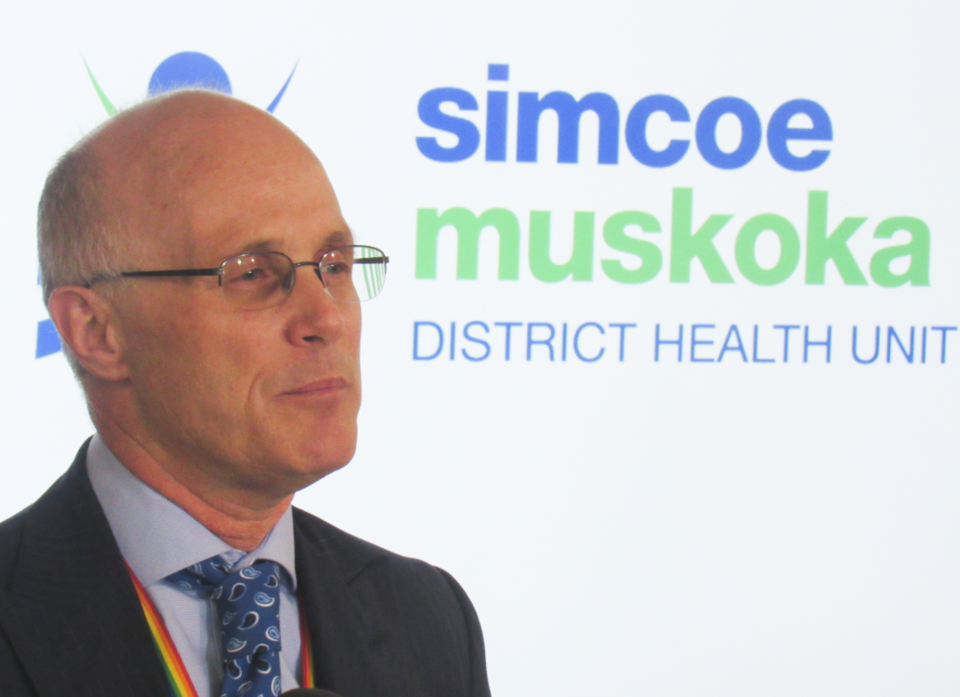It’s all hands on deck for the foreseeable future for health-care workers in the region, many of whom have been redeployed to COVID-19 response, whether on the front lines or running surveillance.
Dr. Charles Gardner, the chief medical officer of health for Simcoe Muskoka District Health Unit, expressed his appreciation today for health-care workers and highlighted the strain of a pandemic on all corners of the medical field.
“Many have had to endure the stress of being exposed to cases … the personal protective equipment is very uncomfortable, and they know there is much more coming,” he said. “This is merely the beginning.”
This morning, the local health unit announced there are 35 lab-confirmed cases of COVID-19 in the region.
The health unit has confirmed cases in Collingwood (1), Barrie (7), Orillia (4), Springwater (1), Clearview (2), New Tecumseth (3), Adjala-Tosorontio (1), Bradford West Gwillimbury (6), Essa (1), Midland (2), Oro-Medonte (1) and Huntsville (1). The remaining cases have not yet been posted with information.
Two men in Barrie, both in their 70s and who had pre-existing medical conditions, have died recently from the coronavirus at Royal Victoria Regional Health Centre (RVH). Hospital officials recently confirmed the two men were related.
Hospitals across the province have cancelled most non-emergency surgeries, and other appointments. Primary care physicians have reduced their patient appointments and switched to telephone or virtual appointments to provide care.
The physicians and staff in the hospital departments or primary care offices that are reduced or shut down have been redeployed to emergency departments, assessment centres, and anywhere else they’re needed.
“It’s basically a redirecting of resources and people in their work from what they were doing before,” said Gardner.
On top of the extra staff time needed to care for COVID-19 patients and run assessment centres, there’s a requirement for all health-care workers to self-isolate for 14 days after returning from travel.
Gardner confirmed five health-care workers in the Simcoe Muskoka region contracted the virus through travel and are currently self-isolating. They will have to have two negative COVID-19 test results within 24 hours of each other before they are cleared to return to work.
Other health-care workers have had to self-isolate due to potential exposure or contact with a case.
At the health unit, Gardner said there has also been redeployment of staff and an increased workload.
“We’ve had to completely redirect staffing to respond to COVID-19,” said Gardner.
The health unit is responsible for surveillance of COVID-19 cases in the region, meaning they will follow up with confirmed cases to track their movements for the 24 hours leading up to the onset of symptoms.
Health unit staff will reach out to close contacts of confirmed cases, and recommend they self-isolate.
Gardner also said the health unit will keep track of all confirmed or probable cases while they are in self-isolation.
“We follow them as well as their close contacts closely,” said Gardner.
For one case recently announced in Barrie, a man in his 20s was returning from the UK when he started experiencing symptoms.
When the health unit learned he was symptomatic on the plane, they contacted Ontario Public Health to suggest the province obtain the flight seating plan and contact those who were nearby the Barrie man during the flight to advise them to self-isolate.
Due to COVID-19, the health unit has had staff incurring overtime, and some part-time positions have been made into full-time ones.
“We are indeed incurring additional costs,” said Gardner. “We will spend what we need to respond to this and use our reserves as we may have to.”
But money isn’t the only factor.
“There are other natural limits, such as being able to recruit people,” said Gardner. “In an ideal world, we’d be able to get a lot of people to do this work.”



